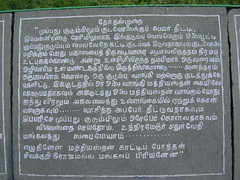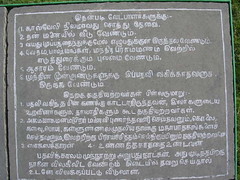
|

|
Our history crazy man Ravages was on a tour of Kanceepuram, Uttaramerur and few other places. During his trip he went to a temple in Uttaramerur which was a Pallava temple rebuilt by Parantaka I and in the walls of the temple he found inscriptions which talk in detail about a process for selecting an officer. These instructions which are more than 1000 years old are one of the earliest explaining the process for conducting an election.
But broadly, it tells that to elect an officer, candidates are invited from the 30 families living in the 12 villages in and around Uttaramerur. Each member will put write the name of a candidate on a piece of palm-leaf (olai) and put into a small vessel (kudam) after which, one evening, every citizen, without any discrimination or differences will assemble in the hall of the temple. Here, the current village head (Madhiyastan) will accept all the ballot-papers, without cheating (the procedure for accepting is detailed – the head-guy should spread his fingers wide, accept the ballot paper on his fore-arms and prove to the assembly he hides no extra ballot)
The head-guy will then read out the name on the ballot-paper…and as he reads, the scribe will mark it down. This way, the one who gets the max-votes will be elected and everyone in the assembly will accept him as their officer. The final tablet describes the minimum requirements for a candidate as well as what circumstances bar him from competing the elections
Requirements
1) Must own a plot of land
2) His own house on his own land
3) Minimum age: 35. Max: 70
4) Must be well versed in the vedas, and other knowledges. Should be able to explain it competently
5) Must be pious
6) Should not have occupied the same post in the preceeding 3 yearsThings that would disqualify a person from the polls
1) One who fails to show proper accounts after elections. (Apparently, bribery in India isn’t new 🙂 The best thing is, a corrupt official also means his family and dependants are barred from the elections
2) The one who has committed adultery, murder, burgulary, and alcohol consumption is disqualified…these four acts are considered great-sins. Also, anybody who has committed the sins and is reforming from them is barred
3) The one who eats that which shouldnt have been eaten (what kinda rule is this?)Finally, the inscriptions talk of the tenure of the elected official – 360 days. (Perhaps based on the lunar calendar year?) At the end of the period, the official should voluntarily resign from his post. Also, if he faults along the way, he will be removed from his post immediately.
In a followup mail Kingsley says he is skeptical of this interpretation and states that this was pseudo-democracy since it was used only to rotate officers from a pool.
See Also: India – Democracy and Identity
Hi JK,
In the Uttaramerur inscriptions, the 3rd point under the things that would disqualify a person from the polls actually mentions not to eat non-vegetarian food. Encourages the candidates to be vegetarian and to have sattvic nature (to think and decide properly).
Note: My hometown is Uttaramerur and my grandfathers were village leaders and panchayat leaders of Uttaramerur-Aransandamangalam.
Regards
Sreekrishna